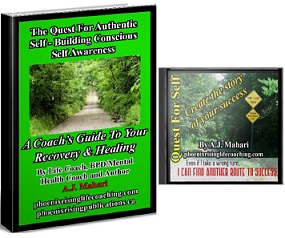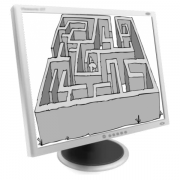![]()
Borderline Devaluation
Borderline devaluation is explored. Devaluation is a defense mechanism used by the borderline to avoid the dealing with the "good and the bad" which is often stressful.
"I judge myself as much as I judge people who are very close to me (friends and family). I usually realize what I dislike so much in. I devalue myself because I have felt devalued by so many others in life. It is the hardest thing in my life to feel competent and of value. I still blame my family and society for my problems. I wish I can change more than I have and be physically, spiritually and emotionally healthy on a consistent basis. I am NEVER consistent with my recovery. I need to learn that life has ups and downs and stop trying for perfection. Basically, I don't want to be me....So I really am learning to accept BPD and continue my journey......Never give up anyone.... I sure am not!!!!" -- Lisa H.
"For someone to devalue me, they have to say (in so many words or in implication) that what I am saying does not matter. I don't mind being disagreed with, but I hate being dismissed." -- Gaby
"I believe that I certainly do devalue and judge others. I have a problem, I think, with "black and white thinking", but lately I am trying to see the whole organism, totally, the entire person, and this helps me a lot to dislike the act but like the person. When i devalue and judge myself, it triggers the downward spiral of dark emotions which are always there, i.e., self-hate, feelings of inferiority, paranoid thinking (usually that others are staring at me because I look like the "Elephant Man"). The last item is particularly disturbing because I am told that I am very cute and sexy and attractive; men come on to me when I go out and I have a boyfriend who adores me; the disturbing part is I look in the mirror and see a hideous thing staring back at me. I know that devaluation and negative thinking and self-pity are poisons for me, and i believe they will eventually destroy me.
I define devaluation as looking at a person as something less than what they are, e.g., the act that they do and not who they are . I know that that isn't accurate and correct. A person has many, many different shades of colors, and indeed all the colors of the rainbow. When I judge, my judgments are severe and usually without all of the information. I jump the gun, so to speak." --flannery
When I was borderline devaluation played a very central role in my cognitively distorted thinking.
Devaluation is an actively-passive way in which a borderline can continuously invalidate his/her environment (which replays out his/her past in which he/she felt invalidated) and or his/her sense of self both separately from and in relation to that environment. Devaluation is also the means by which a borderline seeks to soothe him/herself. It is a defense mechanism against knowing someone else and allowing "self" to be known by others. It stems from "all or nothing" and "black and white" constrictive thinking. Devaluing others is often the result of feeling "less than", feeling too damaged and too defective to be on equal footing with others. In order to raise him/herself up the borderline feels the need to pull others down and so devalues them. When others are devalued the borderline can then feel better about himself/herself.
Devaluation can often be a mix of transference and projection unto someone close to the borderline who is perceived by him/her as an lacking nurturing and as being invalidating (and often abusive parent/or caregiver) from the past. This devaluation is a an avoidant behaviour because it enables the borderline to displace his/her negative feelings onto "other". Thus he/she does not hold those feelings, feel and deal with those feelings as an "average" (non-personality-disordered) person would.
Devaluation, however, is often the peak of a very slippery slope. When one devalues others and one's self a deterioration in other behaviour naturally follows. When one is devaluing others there is a lack of respect shown and an attitude of "false" entitlement. This can lead a borderline to perpetuate conflict and generally act out.
In order to stop devaluing others the borderline must come to realize that there is both good and bad in everyone and everything. They must also become more self-aware. Often what is devalued in others is what is most true (and unaccepted) about "self".
Devaluing others occurs when a borderline needs to decrease their value and or importance. This can occur when a borderline begins to feel close to someone or when they like someone. It can also occur when a borderline feels invalidated, left out, ignored and not heard by someone.
The way to stop devaluing others is by getting to better know and accept yourself. Borderlines must learn to get in touch with their vulnerability and their capacity to hold conflicting emotions. Also of paramount importance in learning to stop devaluing self and others is being much more aware of one's expectations. If you expect too much from someone chances are they will fall short. In their not measuring up, you will find yourself devaluing them for whatever reason. It is also important to be vigilant about taking and maintaining one's personal responsibility. The borderline must learn to accurately perceive the grey, between the black and the white in order to stop this very destructive devaluing. Devaluation can be devastating to any interaction or relationship. When a borderline begins to devalue someone they have stopped experiencing who that person actually is and have crossed the line into borderline misinterpretation, misperception and cognitively-distorted thinking.
Devaluation is also an attempt to on the part of the borderline to gain a "feeling" of being in control. (no matter how much of an illusion that "feeling" is). Devaluation is the opposite side of the coin cognitively from "splitting". In splitting the borderline views the other person as all good whereas when the borderline devalues the other person the perception is then all bad.
In order to grow through this primitive defense mechanism the borderline must learn to view, perceive and hold others and "self" consistently -- the good and the bad that co-exist. It is the inability to keep the "big picture" in conscious awareness that leads to splitting and devaluing.
In her book, "Imbroglio", Janice Cauwels quotes Dr. Kernberg: "To the borderline, oneself and others are defined by only the most recent feelings and behavior. Borderlines read each action by other people because they have no sense of consistency and thus cannot predict behavior."
Defining others by one's most recent feelings and the experience of one's most recent behaviour makes for a very inconsistent, yet persistent emotional roller-coaster ride in any relationship. Borderlines lacking the ability to sense consistency cannot predict behaviour, in my opinion, because they are defining the behaviour of all others according to the behaviour of parents, past abusers and so forth. Being triggered back to the dissociated reality (perpetually) of one's past keeps many borderlines "stuck" in this most self-defeating pattern of trying to relate to others.
As with any change, to stop splitting and devaluing others and one's own self requires that you first become aware that this is what you are doing. If you are borderline (unless far along in recovery) this IS what you are doing. It is defeating you and defeating your relationships. The change will take place gradually once you begin to re-train yourself to think differently. In order for a borderline to move from consistent devaluation to a more cognitively sound perception (in the grey) of self and others one must look at his/her own distorted thoughts. With the help of a good therapist one can begin to see the difference between running with one's own cognitively-distorted thoughts which are impulse and patterned reactions to an unlearned and non-existent capacity to perceive both the good and the bad in self, others and the environment and slowing down to think about what one is concluding or assuming about others.
In human relationships there are positive and negative experiences. These experiences illicit corresponding thoughts and feelings within each of us. It is up to the borderline though, to learn how to hold those feelings and or thoughts so as to not do irreparable damage to relationships. It has been my experience in recovery that when I learned to accept the good and the bad within myself I have since been able to accept it in others. Some interactions are negative. Some interactions and experiences are positive. Neither makes me more or less of a person. And, neither the positive nor the negative experienced with others or within myself validates or invalidates me, as it "felt" like or "seemed" like it did when I was borderline.
© Ms. A.J. Mahari, December 29, 1999















